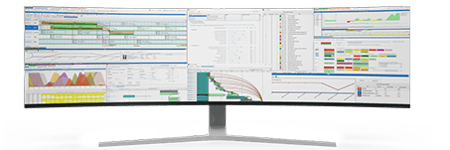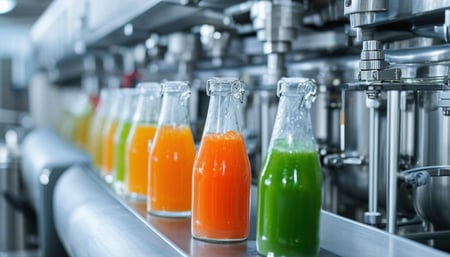Mastering Flexibility: Aligning Operations with Adaptable Planning
The pressure to meet changing consumer demands, comply with strict regulatory standards, and maintain high product quality is ever-present in food and beverage manufacturing. For Production Planners, these demands translate into the need for efficient scheduling, resource allocation, and operational alignment to deliver on time without compromising quality.
Adding to these complexities, the recent push toward digitalization has introduced new tools like PlanetTogether APS (Advanced Planning and Scheduling), integrated with robust enterprise systems such as SAP, Oracle, Microsoft, Kinaxis, or Aveva. When harnessed effectively, this integration can help Production Planners create adaptable, resilient plans that align operations seamlessly to respond to an evolving market.
This blog explores how adaptable planning can be achieved through integrated APS systems like PlanetTogether, focusing on the practical benefits and best practices for aligning operations in Food and Beverage manufacturing. Whether you're tackling fluctuations in demand, seasonal variations, or unexpected supply chain disruptions, an integrated approach can transform your planning processes, offering both flexibility and control.

The Need for Adaptable Planning in Food and Beverage Manufacturing
Food and Beverage manufacturing operates under unique constraints that require adaptability. From ingredient perishability to rigid sanitation requirements, Production Planners need dynamic scheduling tools that can adjust to these variables without compromising efficiency. Here are some common challenges that highlight the importance of adaptable planning:
Demand Variability: Consumer trends can shift quickly, and Production Planners must adapt schedules and capacity to meet these fluctuations.
Supply Chain Disruptions: Global supply chain issues can affect the availability of raw materials, requiring Production Planners to pivot plans accordingly.
Compliance with Safety Standards: The industry’s rigorous regulatory environment mandates frequent audits, inspections, and documentation, necessitating quick adjustments to ensure compliance.
Seasonal Adjustments: For many food and beverage products, seasonal changes impact ingredient availability and demand, requiring flexible production schedules.
Adaptable planning addresses these issues by allowing planners to adjust production timelines, manage inventory effectively, and minimize the risk of stockouts or overproduction. This is where integration with advanced systems like PlanetTogether and ERP platforms such as SAP, Oracle, Microsoft, Kinaxis, or Aveva plays a pivotal role.
![]()

Leveraging PlanetTogether APS Integration for Enhanced Adaptability
An Advanced Planning and Scheduling (APS) system like PlanetTogether allows you to optimize production scheduling and resource management with real-time visibility across operations. When integrated with ERP platforms, it can provide a comprehensive view of all production parameters, from raw material availability to demand forecasts and labor allocation. Here’s how the integration helps:
Real-Time Data Synchronization: Integrating PlanetTogether with ERP systems ensures that Production Planners have access to the latest data. For example, when sales data is updated in SAP or Microsoft Dynamics, PlanetTogether automatically adjusts production schedules, maintaining alignment with demand.
Enhanced Forecast Accuracy: With integrated data from platforms like Oracle or Kinaxis, PlanetTogether can leverage historical trends and real-time inputs to generate more accurate forecasts, enabling Production Planners to make proactive adjustments.
Better Resource Allocation: ERP platforms provide insights into inventory levels, labor availability, and production capacity. PlanetTogether can pull this data to allocate resources more effectively, reducing waste and enhancing productivity.

Practical Steps for Creating Adaptable Production Plans
Let’s walk through some practical steps that Production Planners in Food and Beverage manufacturing can take to create adaptable production plans. These strategies, combined with an integrated APS-ERP approach, will help you stay agile in the face of change.
Build a Data-Driven Forecast
The foundation of any adaptable plan is an accurate forecast, and data is key. By integrating PlanetTogether with systems like Kinaxis or SAP, you can access up-to-date demand projections, historical sales data, and market trends. Here's how to optimize your forecast:
Leverage Historical Data: Use historical sales and seasonal patterns to predict demand. With ERP integration, this data is readily accessible.
Incorporate Real-Time Updates: As new sales data or demand signals come in, your APS system should adjust forecasts automatically, keeping your plan aligned.
Apply What-If Scenarios: PlanetTogether allows you to run "what-if" scenarios, assessing how different demand patterns could impact production. This prepares you to adjust proactively.
Utilize Flexible Scheduling Features
Rigid production schedules can lead to costly inefficiencies. With PlanetTogether’s flexible scheduling features, you can adjust schedules dynamically based on current needs. Here’s how it works:
Automated Schedule Adjustments: PlanetTogether’s integration with ERP platforms ensures that changes in demand or inventory levels are immediately reflected in production schedules.
Production Sequence Optimization: Food and Beverage manufacturing often requires specific production sequences (for example, allergen-free runs). APS systems can optimize these sequences, minimizing setup times and enhancing efficiency.
Quick Rescheduling Capabilities: If an ingredient is delayed or a machine breaks down, PlanetTogether can help you quickly re-sequence production, minimizing downtime.
Monitor KPIs and Operational Metrics Closely
Tracking key performance indicators (KPIs) such as On-Time Delivery, Production Downtime, and Waste Reduction is essential to maintaining an adaptable plan. By using PlanetTogether in conjunction with an ERP system, you can monitor these KPIs in real-time.
Customizable Dashboards: Integrated APS-ERP solutions offer customizable dashboards where you can monitor metrics, compare performance against targets, and identify areas for improvement.
Alerts and Notifications: Set up alerts for specific metrics, such as low inventory levels or delayed orders, to make timely adjustments.
Continuous Improvement: Use performance data to identify bottlenecks and optimize processes. For instance, if on-time delivery rates are below target, adjust production timelines to improve this metric.
Engage in Proactive Inventory Management
Inventory management in the Food and Beverage industry is particularly challenging due to the perishability of ingredients. An integrated APS-ERP system enables you to manage inventory levels more effectively:
Safety Stock Adjustments: Adjust safety stock levels based on demand fluctuations and lead times, helping prevent shortages or excesses.
Supplier Collaboration: By integrating with ERP platforms like Oracle or SAP, you can share forecasts and schedules with suppliers, improving raw material availability.
Real-Time Stock Visibility: PlanetTogether’s inventory tracking integrates with ERP systems, providing a unified view of current stock levels, which helps in making timely decisions.
Empower Cross-Functional Collaboration
Adaptable plans require collaboration across departments. Production Planners, Procurement, Quality Control, and Sales teams all need to be aligned. Integrated systems facilitate this:
Shared Dashboards: Teams can access the same data and production schedules, breaking down silos and ensuring alignment.
Improved Communication Channels: With systems like Microsoft or SAP integrated with PlanetTogether, teams can communicate seamlessly within the platform, enhancing responsiveness.
Collaborative Planning Sessions: Use APS data in planning sessions to involve multiple stakeholders, ensuring that everyone is on the same page regarding production priorities and constraints.

The Advantages of an Adaptable Plan for Food and Beverage Manufacturers
With adaptable planning, Food and Beverage manufacturers can experience several significant benefits, all of which directly impact operational efficiency and customer satisfaction:
Reduced Waste and Downtime: Flexible plans minimize production delays and reduce waste, enhancing both sustainability and profitability.
Enhanced Product Quality: Quick adjustments to production schedules and sequences help maintain product quality, especially when ingredient availability or machine maintenance affect timelines.
Increased Customer Satisfaction: Adaptable plans enable faster response times to demand changes, ensuring products reach consumers on time.
Regulatory Compliance: Integrated APS-ERP systems support compliance by providing traceability, documentation, and visibility into production processes.
The manufacturing landscape is evolving rapidly, with digital transformation and Industry 4.0 technologies reshaping how production planning is conducted. PlanetTogether’s integration with ERP systems positions Food and Beverage manufacturers to embrace these changes confidently. By incorporating predictive analytics, IoT data from the factory floor, and even machine learning models, planners can move from reactive adjustments to proactive, data-driven decision-making.
Future-proofing adaptable planning means continuously evolving with industry demands, digital innovations, and market trends. With PlanetTogether integrated with robust ERP systems like SAP, Oracle, Microsoft, Kinaxis, or Aveva, Production Planners in Food and Beverage manufacturing are well-equipped to meet the challenges of today and the opportunities of tomorrow.
Creating adaptable plans to align operations isn’t just about flexibility; it’s about having the right tools and systems in place to respond effectively to changes. For Production Planners in Food and Beverage manufacturing, an integrated approach with PlanetTogether and ERP systems offers a pathway to enhanced adaptability, efficiency, and resilience. Embrace this integration to streamline processes, empower teams, and, ultimately, deliver high-quality products that meet the demands of a dynamic market.
Are you ready to take your manufacturing operations to the next level? Contact us today to learn more about how PlanetTogether and integrated scheduling solutions can help you achieve your sustainability goals and drive success in the food and beverage industry.
Topics: PlanetTogether Software, Integrating PlanetTogether, Food and Beverage Manufacturing, Build a Data-Driven Forecast, Utilize Flexible Scheduling Features, Engage in Proactive Inventory Management, Monitor KPIs and Operational Metrics Closely, Empower Cross-Functional Collaboration




















LEAVE A COMMENT